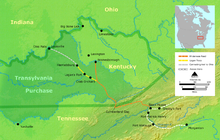
The Transylvania Colony, also referred to as the Transylvania Purchase or the Henderson Purchase, was a short-lived, extra-legal colony founded in early 1775 by North Carolina land speculator Richard Henderson, who formed and controlled the Transylvania Company. Henderson and his investors had reached an agreement to purchase a vast tract of Cherokee lands west of the southern and central Appalachian Mountains through the acceptance of the Treaty of Sycamore Shoals with most leading Cherokee chieftains then controlling these lands. In exchange for the land the tribes received goods worth, according to the estimates of some scholars, about 10,000 British pounds ($1.5 million U.S. in 2016). To further complicate matters, this frontier land was also claimed by the Virginia Colony (particularly following Lord Dunmore's War) and a southern portion by Province of North Carolina.
The Transylvania Colony was located in what is now the central and western parts of Kentucky, and a chunk of north central Tennessee. The American pioneer and frontier explorer Daniel Boone was hired by Henderson to establish the Wilderness Road going through the Cumberland Gap and into southeastern Kentucky to facilitate settlement. A governmental compact was concluded by the settlers in May 1775. Most settlement was forestalled by the Revolutionary War, except around established towns. Henderson's Transylvania claim in Kentucky was invalidated by the Virginia General Assembly in 1778, and the remaining Tennessee portion was invalidated by North Carolina in 1783. Henderson was compensated with a land grant along the Ohio River in western Kentucky and the current town of Henderson was founded there.